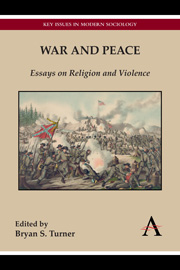Book contents
- Frontmatter
- Contents
- Acknowledgments
- Contributors
- Introduction by Bryan S. Turner
- War
- Chapter 1 Sacred Memory and the Secular World: The Poland Narratives
- Chapter 2 A Messianic Multiple: West Papua, July 1998
- Chapter 3 Lincoln, the Ministers of Religion and the American Jeremiad
- Chapter 4 Spiritual Violence: Max Weber and Norbert Elias on Religion and Civilization
- Peace
Chapter 2 - A Messianic Multiple: West Papua, July 1998
from War
Published online by Cambridge University Press: 05 May 2013
- Frontmatter
- Contents
- Acknowledgments
- Contributors
- Introduction by Bryan S. Turner
- War
- Chapter 1 Sacred Memory and the Secular World: The Poland Narratives
- Chapter 2 A Messianic Multiple: West Papua, July 1998
- Chapter 3 Lincoln, the Ministers of Religion and the American Jeremiad
- Chapter 4 Spiritual Violence: Max Weber and Norbert Elias on Religion and Civilization
- Peace
Summary
Introduction: Signs of Hope
Hopes connected to the arrival of a messiah contain “the attraction, invincible élan or affirmation of an unpredictable future-to-come (or even of a past-to-come-again),” in the words of Jacques Derrida (2002, 253). “Not only must one not renounce the emancipatory desire,” writes Derrida, “it is necessary to insist on it more than ever” (2002, 74). Describing a universal structure of feeling that works independent of any specific historical moment or cultural location, Derrida describes what he calls messianicity without messianism, a quasi-transcendental notion that “is not bound up with any particular moment of (political or general) history or culture” (2002, 253). Derrida's sense of expectation is thus not oriented towards a specific program, event, project or messiah (Derrida 1994, 24–5; 2002, 167). His idea of messianicity is that it is “without content,” in contrast to messianism which contains specific objects of desire (Derrida 1994, 28).
Rather than Derrida's messianicity without messianism, or fixation on the arrival of any single messiah, I discovered a different sort of messianic logic at work in West Papua, the half of New Guinea under Indonesian rule. West Papuans harbor hopes for a messianic multiple; they have pinned their freedom dreams on multiple specific figures, political events and future possibilities. The messianic multiple is a structure of feeling that moves around like liquid mercury – dancing about in different directions, coalescing around multiple figures of desire.
- Type
- Chapter
- Information
- War and PeaceEssays on Religion and Violence, pp. 37 - 62Publisher: Anthem PressPrint publication year: 2013

